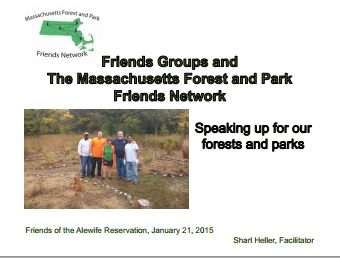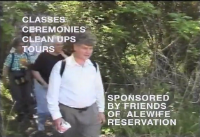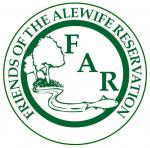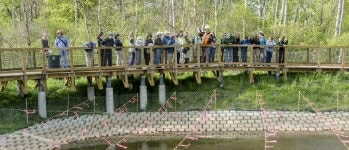Bob Makin, @ReporterBMakin 6:48 p.m. EDT June 27, 2014
A deal to build condos and retail on the National Lead site in Sayreville is being called 'pay to pave.'
In the wake of a recent cost-share agreement between the New Jersey Turnpike Authority and the developer of the former National Lead site in Sayreville, Deputy Assembly Speaker and lifelong borough resident John Wisniewski said he won't miss the site's two chemical lagoons, pictured, that long had been an eyesore beneath the Driscoll Bridge. (Photo: FILE PHOTO )Buy Photo
- Brian O'Neill is the developer of Luxury Point at the former site of National Lead.
- O'Neill pledged $15M for improvements to Sayreville exit of the Garden State Parkway.
- Environmentalists say the agreement is a handout to the developer.
SAYREVILLE – The Garden State needs another mall like it needs another toxic waste site, New Jersey Sierra Club Director Jeff Tittel said.
But the state is set to get both in a single location as the former National Lead site is developed into Luxury Point, a 425-acre mixed- use project with age-restricted condominiums and offices, recreational and retail space, including a planned Bass Pro Shops.
Earlier this week, the New Jersey Turnpike Authority Board of Commissioners approved a cost-sharing agreement with developer Sayreville Seaport Associates for the design and construction of local road improvements to Garden State Parkway Exit 125.
While Assemblyman John S. Wisniewski, D-Middlesex, praised the approval, Tittel slammed the developer's $15 million contribution to the road improvement project as "pay to pave."
"That interchange redesign is not about helping commuters get to and from work," Tittel said. "It's about building a private driveway to another mall. No matter how it's designed, it's going to create more traffic and air pollution to people driving to work or trying to get to the Shore on the weekends. There's no purpose for it than to help a mall developer, rather than do other things that can help commuters."
"There is no money to rebuild roads and bridges," he continued. "There's no money to help commuters on a daily basis, but we can fix the Parkway to help a mall developer cause more traffic pile ups. It is pay to pave. They're giving some money to get a huge benefit, and they're only paying a small fraction of the total cost. The people stuck in traffic are going to pay for the interchange, which is going to give them more traffic headaches."
Traffic backs up on the Garden State Parkway southbound in Sayreville as the Memorial Day 2007 holiday weekend begins. Environmentalists have criticized the state approval of a cost-share agreement between the New Jersey Turnpike Authority and the developer of the National Lead site in Sayreville, citing that it will cause more traffic and air pollution at the Sayreville exit of the Parkway.
Project history
The Turnpike Authority said the interchange has been in its master plan for the past 10 years. The agency also said it didn't know how much the construction would cost because it's only in the design and negotiation phase, but Tittel estimated it would be about $100 million.
Brian O'Neill, the owner of Sayreville Seaport parent company, O'Neill Properties, said in 2008 that Luxury Point would be 80 percent leased and occupied by 2013. O'Neill recently announced that Bass Pro Shops now is expected to open its location there during the last quarter of 2015.
The delay has Edison Wetlands Association director Robert Spiegel concerned that Luxury Point will be the Raritan River's version of the EnCap Meadowlands Redevelopment Project. EnCap resulted in federal corruption charges, probation and fines for founder William Gauger, rather than the jobs, golf course and other promises he made in the wake of being awarded tax subsidies. "At the end of the day, that project did not go through, and this project is the same thing, a complete waste of hard-earned taxpayer dollars," Spiegel said. "People these days work hard for their money, pay taxes and expect those tax dollars to be used with fiscally responsibility. This is a fiscally irresponsible use of tax dollars. Every person who pays taxes should be up in arms about this project."
The $15 million O'Neill has pledged to the Parkway interchange is $5 million less than he received in taxpayer funds, Spiegel said.
In 2011, Sayreville Seaport Associates received a $20 million Brownfields grant culled from state taxes on small businesses. But the Brownfields Development Area designated by the state Department of Environmental Protection was illegitimate, Spiegel said, because according to the Brownfield and Contaminated Site Remediation Act, a BDA must be made up of a cluster of toxic sites, not just one.
To compensate, the borough tried to include the Horseshoe Road Superfund site in the BDA, but the U.S. Environmentally Protection Agency blocked that move, stating that Horseshoe Road was ineligible because it already was being cleaned up with federal tax dollars, Spiegel said.
"But the state gave O'Neill $20 million anyway," he said. "Unfortunately, no one is watching the taxpayers' interests here. Gov. Chris Christie, when he was U.S. attorney, talked about ethics, but when he got elected governor and when other officials are elected to office, they get ethics amnesia and forget they ran on a platform of ethical government and taxpayer accountability. We have none of that here."
The DEP declined to comment, and O'Neill's spokesman did not return several emails asking for response to Spiegel's and Tittel's comments.
The borough spent an additional $40 million for its share of the $82 million purchase of the property from National Lead in 2008, according to media reports. O'Neill paid for the other half and pledged an initial investment of $110 million, including $20 million for a cleanup. Current investment figures were not available at press time.
Economic reality
Rather than spend tax dollars on the property, authorities should have forced National Lead to clean up the toxic mess it left behind when it closed the plant in 1982, Spiegel said. Edison Wetlands is suing Texas-based National Lead in federal court to do just that.
Wisniewski said that there has to be an economic reality in the criticism.
"It's nice to say that National Lead should do this, and National Lead should do that," the Assemblyman said. "National Lead should have cleaned it up, but no one was able to make them do that. And so Bob Spiegel is saying to the people of Sayreville: 'You're stuck with a contaminated piece of property for as long as anyone can imagine until something happens in Texas, and they're forced to do something.' That's unfair to the people of Sayreville and Middlesex County.
"We're not going to get cleanups if there is not funding from the state to help it," Wisniewski continued. "If the state does not subsidize the cleanups, we're going to have a lot of contaminated properties on our hands with no viable economic productivity. Sayreville is a town that relied on a place like National Lead as a tax ratable. Now it's a fallow site that's just degenerating land value and not helping the town at all. This project will generate tax ratables and offset their costs.
"Looking at it through the eyes of Spiegel, the money the state is giving to a private developer is an outrage, but that's not helping Sayreville's tax ratables. And private business is not in the business of coming in, cleaning up a property and losing money on it. There has got to be some measure of assistance."
A lifelong Sayreville resident, Wisniewski said he is happy that the site is being cleaned up. He said that in addition to tax revenue, it will bring jobs to the borough and its first direct public access to the Raritan in many years.
He added that he won't miss the site' s two fluorescent green chemical lagoons that for years was an eyesore for drivers as they entered Sayreville over the Driscoll Bridge.
"Now you'll see something beautiful," he said.
Staff Writer Bob Makin: 732-565-7319; bmakin@MyCentralJersey.com
Preserved on 2014-10-09 from http://www.mycentraljersey.com/story/news/local/middlesex-county/2014/06/27/pay-pave-national-lead-site-developer-pledges-m-parkway-improvement/11552969/
- Home
- Directions
- FAR Wildlife Blog
- Calendar
- News
- Donate Now
- Get Social!
- Storm Water Wetlands
- Plants and Restoration
- Photos
- Videos
- About & Projects
- Master Plan for Alewife
- Archive
- Newsletters
- Contact
 Presentation Spotlighting Alewife Reservation
Presentation Spotlighting Alewife Reservation
 Follow us on Twitter
Follow us on Twitter
 Like us on Facebook
Like us on Facebook
 Follow us on Instagram
Follow us on Instagram
Forward our web address to a friend!
- An Urban Gem - Alewife Reservation Nature Preserve
- Envisioning The Silver Maple Forest
- History and Policies of Cambridge, Belmont, and DEP
- Storm Water Wetlands
- Friends of Alewife Reservation brochure
(front, back) - Technical Analysis of Upper Alewife Basin
- Watershed: An Excursion in Four Parts
- The River Is A Restless Spirit: Life in the floodplain forest
-
Assessment of Silver Maple forest for DEP Adjudicatory hearings and
Patrick Fairbairn, author of the Assessment - Community Native Garden Flora
The
Alewife Reservation
is a unique natural resource for the communities of Belmont, Arlington and Cambridge
and home to hundreds of species, including hawks, coyotes beavers, snapping turtles, wild turkeys and muskrats,
the reservation is a unique natural resource for the community.
Historical information (Powerpoint)
Friends of Alewife Reservation works to protect and restore this wild area and the surrounding area for the water quality, native plants, animals and over 90 bird species with paths for walking, running and biking, recreation, and for classroom education and research. We regularly steward and preserve the Reservation area for wildlife and for the enjoyment of present and future generations.

(video)
By-Laws
About Friends of Alewife Reservation
Statement of Purpose
Citizen Forester newsletter archive
The Birds of the Cambridge Region of Massachusetts

by William Brewster 1906
Nuttal Ornithological Society
Biodiversity Study of Alewife Reservation Area: Species, Habitat, Ecosystems

Inventories by David Brown, wildlife assessor (2003, 2004.) Published by and available from FAR for $10. Write or call for your copy. (sample)
Updated Dave Brown Inventories (2008, 2010)
Inventories of Alewife Reservation Wetland Plants by Walter Kittredge, Botanist (2013)

